I love to read. By God’s grace I am a pretty fast reader; I usually read a couple books each week. I find it helpful to summarize my thoughts on each book and I offer those thoughts in the hope that you will be encouraged to either read or pass over the given title.
It’s been a long while, 28 days to be exact (a record for me), since I did a Recent Reads post. Although my posting has been more infrequent my reading hasn’t. With quite a few titles this time around my thoughts will be shorter than normal, but I hope they will be useful in some way nonetheless.
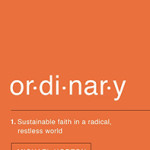 Ordinary: Sustainable Faith in a Radical, Restless World by Michael Horton. A needed book for our restlessly radical age. Ordinary is often brilliant and occasionally redundant. In other words, it’s typical fare for the good doctor from Westminster Seminary California. Not everyone will be convinced he strikes the appropriate biblical balance between ordinary and risky faith, but I think he succeeds. This one is well worth reading.
Ordinary: Sustainable Faith in a Radical, Restless World by Michael Horton. A needed book for our restlessly radical age. Ordinary is often brilliant and occasionally redundant. In other words, it’s typical fare for the good doctor from Westminster Seminary California. Not everyone will be convinced he strikes the appropriate biblical balance between ordinary and risky faith, but I think he succeeds. This one is well worth reading.
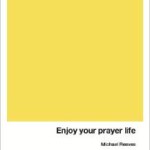 Enjoy Your Prayer Life by Michael Reeves. One my reading maxims is: “If Michael Reeves writes it, read it.” Enjoy Your Prayer Life is more a booklet than a book, but that’s not a disadvantage at all. With his usually color and pithiness Reeves illuminates the struggle of prayer in wise ways. The treatment largely expounds Calvin’s conviction of prayer being “the chief exercise of faith.” I could see this one being a great resource for pastors to continually – and freely – hand out in their churches.
Enjoy Your Prayer Life by Michael Reeves. One my reading maxims is: “If Michael Reeves writes it, read it.” Enjoy Your Prayer Life is more a booklet than a book, but that’s not a disadvantage at all. With his usually color and pithiness Reeves illuminates the struggle of prayer in wise ways. The treatment largely expounds Calvin’s conviction of prayer being “the chief exercise of faith.” I could see this one being a great resource for pastors to continually – and freely – hand out in their churches.
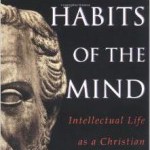 Habits of the Mind: Intellectual Life as Christian Calling by James Sire. Like Guiness, Noll, and Moreland before him, James Sire wants to rescue the mind for the glory of God. We are, after all, called to love the Lord will all our minds. Sire effectively and winsomely argues for pursuing an intellectual life unto the glory of God. Some of his counsel is curious, such as his rapturous affection for the lectio divina method of reading, but anyone concerned with the life of the mind would do well to consult this work.
Habits of the Mind: Intellectual Life as Christian Calling by James Sire. Like Guiness, Noll, and Moreland before him, James Sire wants to rescue the mind for the glory of God. We are, after all, called to love the Lord will all our minds. Sire effectively and winsomely argues for pursuing an intellectual life unto the glory of God. Some of his counsel is curious, such as his rapturous affection for the lectio divina method of reading, but anyone concerned with the life of the mind would do well to consult this work.
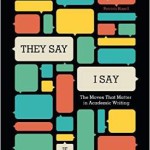 They Say, I Say: The Moves that Matter in Academic Writing by Gerald Graff and Cathy Birkenstein. All academic writing, Graff and Birkenstein say, is “argumentative writing. . . . And we believe that to argue well you need to do more than assert your own position. You need to enter a conversation, using what others say (or might say) as a launching pad or sounding board for your own views” (3). To help writers engage in this kind of conversation They Say/I Say is built around a series of templates designed to help the writer understand and employ “the deep, underlying structure, the internal DNA as it were, of all effective argument.” The templates are really, really useful. I imagine I’ll be returning to this resource often int he future.
They Say, I Say: The Moves that Matter in Academic Writing by Gerald Graff and Cathy Birkenstein. All academic writing, Graff and Birkenstein say, is “argumentative writing. . . . And we believe that to argue well you need to do more than assert your own position. You need to enter a conversation, using what others say (or might say) as a launching pad or sounding board for your own views” (3). To help writers engage in this kind of conversation They Say/I Say is built around a series of templates designed to help the writer understand and employ “the deep, underlying structure, the internal DNA as it were, of all effective argument.” The templates are really, really useful. I imagine I’ll be returning to this resource often int he future.
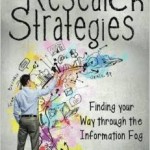 Research Strategies: Finding Your Way Through The Information Fog by William Badke. “Everyone does research. Some just do it better than others,” so says William Badke in the first sentence Research Strategies. Learning in “the information age” presents boundless opportunities for learning, but “faced with a humongous number of Internet sites, not to mention academic and commercial databases of increasing size and complexity, knowing how to navigate through the information fog isn’t something you can pick up easily on your own” (xvii). This textbook is no page turner (what textbook is?), but it abounds in up-to-date strategies for research students.
Research Strategies: Finding Your Way Through The Information Fog by William Badke. “Everyone does research. Some just do it better than others,” so says William Badke in the first sentence Research Strategies. Learning in “the information age” presents boundless opportunities for learning, but “faced with a humongous number of Internet sites, not to mention academic and commercial databases of increasing size and complexity, knowing how to navigate through the information fog isn’t something you can pick up easily on your own” (xvii). This textbook is no page turner (what textbook is?), but it abounds in up-to-date strategies for research students.
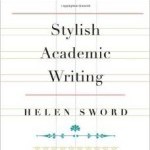 Stylish Academic Writing by Helen Sword. Sword’s mission in Stylish Academic Writing is clear from the outset, “In this book, I argue that elegant ideas deserve elegant expressions; that intellectual creativity thrives best in an atmosphere of experimentation rather than conformity” (vii). Her agenda then is “transformative,” one she hopes will result in improved reading conditions for all. Her research into the writing styles of academics is fascinating and undeniably useful. One of the better works I’ve read on the subject.
Stylish Academic Writing by Helen Sword. Sword’s mission in Stylish Academic Writing is clear from the outset, “In this book, I argue that elegant ideas deserve elegant expressions; that intellectual creativity thrives best in an atmosphere of experimentation rather than conformity” (vii). Her agenda then is “transformative,” one she hopes will result in improved reading conditions for all. Her research into the writing styles of academics is fascinating and undeniably useful. One of the better works I’ve read on the subject.
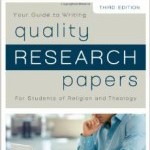 Quality Research Papers: For Students of Religion and Theology by Nancy Vhymeister. Catching on to a theme with these last few titles? Yep, these are all textbooks for an upcoming doctoral seminar on theological research. Quality Research Papers was originally written in Spanish for South American graduates students in 1980. Edits and additions were made throughout the years and in 2014 Zondervan published the third edition of Vhymeister’s work. Its purpose is simple: “to put several aspects of research writing – bibliography, search techniques, organization, and form – into a balanced perspective” (ix). Straight forward and simple.
Quality Research Papers: For Students of Religion and Theology by Nancy Vhymeister. Catching on to a theme with these last few titles? Yep, these are all textbooks for an upcoming doctoral seminar on theological research. Quality Research Papers was originally written in Spanish for South American graduates students in 1980. Edits and additions were made throughout the years and in 2014 Zondervan published the third edition of Vhymeister’s work. Its purpose is simple: “to put several aspects of research writing – bibliography, search techniques, organization, and form – into a balanced perspective” (ix). Straight forward and simple.
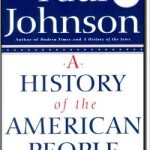 History of the American People by Paul Johnson. I bought History of the American Peeople on sale at Amazon several months ago for $8 and it might be my best ever use of eight greenbacks. Johnson’s tome is, in every sense of the word, magisterial. This is history at its finest. The story is told with compelling verve, the analysis is objective, and the research is immense. Johnson leaves no stone unturned in his account of our fine nation – politics; business and economics; art, literature and science; society and customs; complex traditions and religious beliefs are all given adequate space. An astounding accomplishment!
History of the American People by Paul Johnson. I bought History of the American Peeople on sale at Amazon several months ago for $8 and it might be my best ever use of eight greenbacks. Johnson’s tome is, in every sense of the word, magisterial. This is history at its finest. The story is told with compelling verve, the analysis is objective, and the research is immense. Johnson leaves no stone unturned in his account of our fine nation – politics; business and economics; art, literature and science; society and customs; complex traditions and religious beliefs are all given adequate space. An astounding accomplishment!
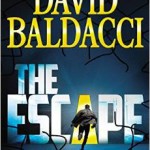 The Escape by David Baldacci. Of all the various Baldacci series John Puller one is my favorite. Baldacci consumed much of last spring’s popular fiction reading and after several months with the author I knew I needed a break. The plots were becoming increasingly predictable which robbed joy from my pleasure reading. My expectations were thus quite tempered when I started The Escape, the third Puller title. Yet by the end I thought to myself, “This is the best Baldacci book I’ve ever read.” Enough said. Moving on . . .
The Escape by David Baldacci. Of all the various Baldacci series John Puller one is my favorite. Baldacci consumed much of last spring’s popular fiction reading and after several months with the author I knew I needed a break. The plots were becoming increasingly predictable which robbed joy from my pleasure reading. My expectations were thus quite tempered when I started The Escape, the third Puller title. Yet by the end I thought to myself, “This is the best Baldacci book I’ve ever read.” Enough said. Moving on . . .
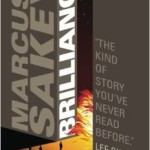 Brilliance by Markus Sakey. I don’t remember how I came across this title – I probably was mindlessly perusing Amazon – but oh! how glad I am that I did. When I saw Gillian Flynn call Sakey “the master of the mindful page turner,” and Michael Connelly write say he’s “one of our best storytellers,” I said, “I’m definitely in.” Creativity and thrills abound in Brilliance; Sakey clearly has talent to spare. This book is soooooo good. Once I put it down I turned to my wife and said, “I can’t remember the last time I had this much fun reading a fiction book.” I’d be surprised if you’d be able to start this and not race your way to the end.
Brilliance by Markus Sakey. I don’t remember how I came across this title – I probably was mindlessly perusing Amazon – but oh! how glad I am that I did. When I saw Gillian Flynn call Sakey “the master of the mindful page turner,” and Michael Connelly write say he’s “one of our best storytellers,” I said, “I’m definitely in.” Creativity and thrills abound in Brilliance; Sakey clearly has talent to spare. This book is soooooo good. Once I put it down I turned to my wife and said, “I can’t remember the last time I had this much fun reading a fiction book.” I’d be surprised if you’d be able to start this and not race your way to the end.
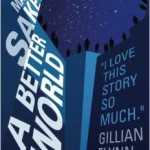 A Better Life by Markus Sakey. I didn’t think my delight towards Brilliance could increase, but when I found out it was the first of a trilogy (“The Brilliance Saga”) the happiness multiplied exponentially. A Better Life picks up the story three months from where Brilliance left off and Sakey in no way disappoints. The story is full of texture, suspense, and roller coaster rides of fun. I can only hope the brilliant Mr. Sakey is racing to finish the trilogy’s final volume. Can’t wait!
A Better Life by Markus Sakey. I didn’t think my delight towards Brilliance could increase, but when I found out it was the first of a trilogy (“The Brilliance Saga”) the happiness multiplied exponentially. A Better Life picks up the story three months from where Brilliance left off and Sakey in no way disappoints. The story is full of texture, suspense, and roller coaster rides of fun. I can only hope the brilliant Mr. Sakey is racing to finish the trilogy’s final volume. Can’t wait!
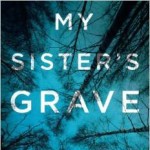 My Sister’s Grave by Robert Dugoni. My holiday binge of mystery/suspense novels continued with Dugoni’s story of Tracy Crosswhite, a Seattle detective who’s been consumed for the last twenty years with the disappearance of her beloved sister. I must give Dugoni credit because two-thirds of the way through I was convinced I had his endgame all sorted, but he threw me an unexpected curve ball as the book ramped up to its conclusion. A breeze of a read, if it is a bit dark at points.
My Sister’s Grave by Robert Dugoni. My holiday binge of mystery/suspense novels continued with Dugoni’s story of Tracy Crosswhite, a Seattle detective who’s been consumed for the last twenty years with the disappearance of her beloved sister. I must give Dugoni credit because two-thirds of the way through I was convinced I had his endgame all sorted, but he threw me an unexpected curve ball as the book ramped up to its conclusion. A breeze of a read, if it is a bit dark at points.
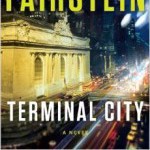 Terminal City by Linda Fairstein. Sometime last summer I watched an interview with Daniel Silva (author of the great Gabriel Allon series) and he recommended Terminal City as a wonderful summer read. Well, I got around to it in the winter, but it was wonderful nonetheless. This is the seventeenth (!) book in Fairstein’s series centered on one Alexandra Cooper. While Terminal City isn’t a work of historical fiction it still manages to pack in a stunning amount of history. All of it surrounding New York City’s Grand Central Terminal. The historical asides will undoubtedly stilt the narrative for some, yet I think they add peculiar flavor to the story. I did find the ending less than satisfying, but I can forgive that for a suprisingly informative work of fiction.
Terminal City by Linda Fairstein. Sometime last summer I watched an interview with Daniel Silva (author of the great Gabriel Allon series) and he recommended Terminal City as a wonderful summer read. Well, I got around to it in the winter, but it was wonderful nonetheless. This is the seventeenth (!) book in Fairstein’s series centered on one Alexandra Cooper. While Terminal City isn’t a work of historical fiction it still manages to pack in a stunning amount of history. All of it surrounding New York City’s Grand Central Terminal. The historical asides will undoubtedly stilt the narrative for some, yet I think they add peculiar flavor to the story. I did find the ending less than satisfying, but I can forgive that for a suprisingly informative work of fiction.
Click here to find other entries in the Recent Reads series.
